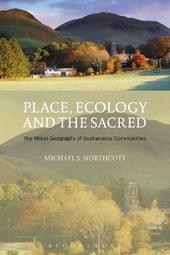
|
Place, Ecology and the Sacred: The Moral Geography of Sustainable Communities
Paperback / softback
Main Details
| Title |
Place, Ecology and the Sacred: The Moral Geography of Sustainable Communities
|
| Authors and Contributors |
By (author) Professor Michael S. Northcott
|
| Physical Properties |
| Format:Paperback / softback | | Pages:248 | | Dimensions(mm): Height 234,Width 156 |
|
| ISBN/Barcode |
9781441134066
|
| Classifications | Dewey:261.88 |
|---|
| Audience | | Undergraduate | | Postgraduate, Research & Scholarly | |
|---|
|
Publishing Details |
| Publisher |
Bloomsbury Publishing Plc
|
| Imprint |
Bloomsbury Academic USA
|
| Publication Date |
18 June 2015 |
| Publication Country |
United States
|
Description
People are born in one place. Traditionally humans move around more than other animals, but in modernity the global mobility of persons and the factors of production increasingly disrupts the sense of place that is an intrinsic part of the human experience of being on earth. Industrial development and fossil fuelled mobility negatively impact the sense of place and help to foster a culture of placelessness where buildings, fields and houses increasingly display a monotonous aesthetic. At the same time ecological habitats, and diverse communities of species are degraded. Romantic resistance to the industrial evisceration of place and ecological diversity involved the setting aside of scenic or sublime landscapes as wilderness areas or parks. However the implication of this project is that human dwelling and ecological sustainability are intrinsically at odds. In this collection of essays Michael Northcott argues that the sense of the sacred which emanates from local communities of faith sustained a 'parochial ecology' which, over the centuries, shaped communities that were more socially just and ecologically sustainable than the kinds of exchange relationships and settlement patterns fostered by a global and place-blind economy. Hence Christian communities in medieval Europe fostered the distributed use and intergenerational care of common resources, such as alpine meadows, forests or river catchments. But contemporary political economists neglect the role of boundaried places, and spatial limits, in the welfare of human and ecological communities. Northcott argues that place-based forms of community, dwelling and exchange - such as a local food economy - more closely resemble evolved commons governance arrangements, and facilitate the revival of a sense of neighbourhood, and of reconnection between persons and the ecological places in which they dwell.
Author Biography
Michael S. Northcott is Professor of Ethics at Edinburgh University, UK. He is an ordained Anglican Priest, and a trustee of the Fair Trade company Traidcraft.
ReviewsPlace, Ecology and the Sacred offers valuable insights for religious environmentalism, and it merits consideration by anyone interested in community-based responses to environmental crises. * Theology Journal * Identifying and engaging with the problem [of religious environmentalism] is a very worthwhile exercise in itself and this book, which is full of thought-provoking insights, certainly does that. I commend it highly. * Modern Believing * Jesus was "of Nazareth" and we, too, are creatures of place and places. In this book a world-class environmental theologian, Michael Northcott, turns his spade to help reset the seeds of Eden. -- Alastair McIntosh, Visiting Professor, University of Glasgow, UK In Place, Ecology, and the Sacred Michael Northcott explores the history and politics of Earth-destructive and species-extincting human conduct. The book provides an incisive and insightful analysis of the historical role of wealthy individuals, transnational corporations, and the government officials they influence to thwart citizens' efforts to effect a healthful and employment-producing environment. On a note of hope for the present and future, the book discusses projects that foster the ecological wellbeing of humanity, all living beings, and our shared Earth home. I highly recommend Place, Ecology and the Sacred. I look forward to using it in my socioecological ethics courses. -- John Hart, Professor of Christian Ethics, Boston University, USA; author of Sacramental Commons: Christian Ecological Ethics (2006) and Cosmic Commons: Spirit, Science, and Space (2013) We face what Stephen Emmott calls 'an unprecedented planetary emergency' due to the pressure of enormous numbers of people, many very affluent, on a tiny planet. More than half of us live in cities and this proportion increases year by year. What to do about this? Michael Northcott explores the urgent need for a new moral economy of place, inconceivable without challenging the power of corporations in our world. An urgent, intelligent reflection by one of our leading theologians who has sought for many years to draw our attention to the immense seriousness of the impact of global warming. -- Timothy Gorringe, Professor Emeritus, University of Exeter, UK
|